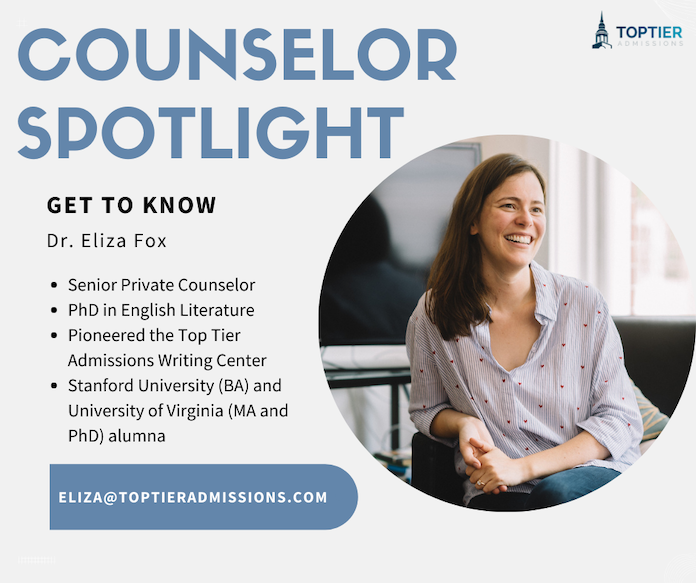Our mission at Top Tier Admissions is to provide comprehensive support, guidance, and resources to students and families navigating the college admissions process. We prioritize teen mental health and work towards alleviating the stress and pressures associated with this process, empowering students to make informed decisions, nurturing their authentic love of learning, and encouraging academic achievement.
You attended Stanford University for undergrad, where you studied English and creative writing. What was the highlight of your college years and what do you wish you had known about Stanford when you were an applicant?
A lot of my students are interested in Stanford for its STEM programs, but I know firsthand that the university’s humanities offerings are also incredible. As an English major, I studied Irish poetry with Eavan Boland, attended readings by Stegner Fellows like Jesmyn Ward, and read A Room of One’s Own at King’s College (where Woolf drew inspiration for the book). After I developed an interest in journalism, Stanford’s Rebele Journalism Program sponsored my internships at The Philadelphia Inquirer.
When I applied to Stanford, I knew the school had a strong English Department, but I had no idea just how many opportunities the university offered that would be a great fit for me. I now push my students to research Stanford—and all of their other target colleges—thoroughly before they apply. It not only makes them more compelling applicants (especially when it comes to interviews and essays about “why this school”), but also ensures they can really hit the ground running when they arrive as new freshmen.
Tell us a bit more about your graduate work at the University of Virginia, especially your interest in digital humanities. What is your advice for high school students who want to learn about this field?
Digital humanities is a field that uses technological tools and computational methods to study humanities questions—a fascinating subject for people with interdisciplinary interests! At UVA, I explored DH when I worked on Ivanhoe, a digital game meant to foster literary interpretation and collaboration. There are, however, lots of other types of DH work out there, ranging from digital archives to augmented reality projects.
Very few high schools cover digital humanities, so most of my students don’t have much experience with the field. If they seem intrigued by the subject, we’ll often start by exploring some of the curated projects on sites like Digital Pedagogy in the Humanities. That can help them get a sense of what’s possible in the field and encourage their creativity. I also always encourage students interested in DH to bolster their coding skills. Proficiency in Python, R, etc. makes it much easier to develop a unique project!

COLLEGE PRIVATE COUNSELING
Top Tier’s Exclusive Program
Develop an organized and effective application strategy that leverages your academic and professional experience to stand out. Unlimited counseling time.
How has your career as an educator and published author informed your approach to college essay guidance?
One of the key things that I learned as a writer and that I taught to all of my students at UVA was to pay attention to genre. A strong academic essay will look very different from a strong newspaper article, and both will differ from an excellent poem or a piece of humor writing. Paying attention to your style and expected audience can help ensure that your writing is well-received.
I keep this guidance in mind now when I work with students on their college essays, knowing that most high school students have no experience with this particular type of writing. We generally begin by reviewing sample essays and talking about the parts of them that work (and sometimes don’t work) to ensure that students have a clear sense of what their own essays might look like. That knowledge makes it much easier for them to dive into the brainstorming and drafting process.
Your students have remarkable success getting their creative writing published in competitive journals. What are your tips for high school students who want to submit their writing to contests or publications?
Many students don’t realize how many literary magazines and contests are out there. There are tons! If you like writing, you can almost always get your work published. The key is to make sure you are writing consistently and submitting your work often. Don’t let a “no” from one journal discourage you from submitting to another!
I also recognize that many students don’t have time for independent creative writing during the school year. With that in mind, I encourage them to take advantage of summer and winter breaks to produce as many rough drafts as possible. If they can produce a number of new pieces during their breaks, we can then edit those pieces slowly over the course of the following semester. For students who like this idea, but worry they won’t have the initiative to write during their breaks: an established writing program (like those at Iowa and Kenyon) or a guided tutoring program (like Top Tier’s own Writing Center) can help to keep you motivated!
We know you’re a voracious reader and encourage your students to keep up a consistent reading habit. What are some great books you’ve read recently? And what are some suggestions you have for a student who wants to read more outside of school but doesn’t know where to begin?
These days, I mostly read books to support my students. I recently read How I Killed Pluto and Why It Had It Coming alongside a student with a potential interest in astronomy—we discussed the book to get a sense of what parts of the field intrigued her. I also reread Lord of the Flies so that I could chat about it with a student who was reading it in his English class and struggling to understand it fully.
I know from experience that most students have very little time for free reading outside of school, but I always encourage my students to keep up the practice. Depending on a student’s preferences, I might suggest they read for 15 minutes before going to sleep or embrace audiobooks (which can be especially helpful if you have a long commute to school). I also push my students to explore different types of writing—short stories, graphic novels, news articles, etc.—to find the genres they most enjoy.
Want to work with Eliza? Contact us today to reserve your spot.
- Application Boot Camp®: Celebrating 20 Years of Success - April 25, 2024
- Get to Know College Admissions Expert, Bryan Tomlinson - April 24, 2024
- Breaking News: Cornell Reinstates Standardized Testing - April 23, 2024


